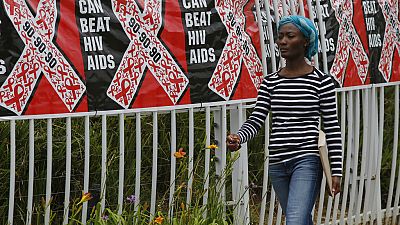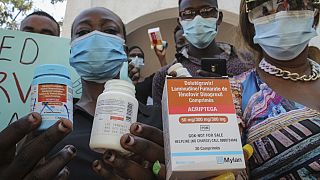South Africa
A new HIV prevention method - a vaginal ring diffusing an antiretroviral drug - will soon be launched in South Africa, one of the world's most AIDS-affected countries, the Global Fund to Fight AIDS announced on Friday (sept 29th).
Three organizations involved in the fight against AIDS in South Africa have ordered 16,000 rings, which should be available in the coming months, according to the Global Fund to Fight AIDS, Tuberculosis and Malaria.
Inspired by those used for female contraception, the silicone vaginal ring gradually diffuses an antiretroviral, dapivirine, and must be changed every month.
"We are convinced that this new ring can have a revolutionary impact on the prevention of HIV (the human immunodeficiency virus, which destroys the body's immune defenses)," explains Peter Sands, Executive Director of the Global Fund, in a press release.
The ring is an alternative to other preventive treatments, or pre-exposure prophylaxis (PrEP), which have revolutionized prevention against the AIDS virus in recent years.
These other treatments involve taking one pill a day or receiving one injection a month, methods which are not necessarily suitable for all those targeted, explain South African prevention organizations.
"Women need access to a range of safe and effective solutions, including the dapivirine ring, so that they can adopt the one that suits them best," stresses Ntombenhle Mkhize, President of the Aids Foundation of South Africa.
By 2023, women and adolescent girls will account for 53% of infections worldwide, according to UNAIDS.
South Africa still has 13.7% of HIV-positive people, one of the highest rates in the world.
But more than 5.4 million of an estimated 8.2 million infected people are taking antiretrovirals - one of the world's largest HIV treatment programs, which has dramatically reduced mortality.
Recent clinical trials have shown that the dapivirine vaginal ring, a device approved by the World Health Organization (WHO), can reduce the risk of seroconversion - going from HIV-negative to HIV-positive - by 35%.
"We hope that many other countries will follow South Africa's lead", added Peter Sands of the Global Fund.
In addition to South Africa, the device has also been approved and launched in several other African countries, including Uganda, Kenya and Zimbabwe.














00:22
Boniface Kariuki, a Kenyan mask vendor shot at close range laid to rest
Go to video
Ruto's $9M mega church sparks outrage amid Kenya's crisis
01:37
UN warns millions will die by 2029 if new funding for HIV programs isn't found
11:17
Bridging the legal gap in Africa’s digital boom {Business Africa}
02:01
Eswatini fears decades of progress in fight against HIV could be undone by US funding cuts
Go to video
First Malaria treatment for babies approved